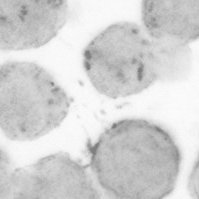Important Changes
DKFZ members can submit their samples through the eBiss system. Non-DKFZ members have access to this service through Multiplexion.
Multiplex human Cell Authentication (MCA)
Cell cultures are important tools for basic and applied biomedical research. About 15-20% of human cell lines have been estimated to be mislabelled or affected by cross-contamination with other human cell lines. Moreover, the mandatory requirement for authentication of any cell lines used for in vitro studies is increasingly emphasized (Lichter et al, 2010, Nature 515:7, Science 346:679) by granting agencies as well as by journals -> no cell-line authentication = no grant/publication.
Short tandem repeat (STR) profiling is widely used to verify the authentication of human cell lines. However, widely used cell lines (e.g. HEK293, CCRF-CEM, Jurkat, ...) with mutations in their mismatch repair genes have been shown to acquire changes in their STR profile upon long-term culture leading to false authentication results.
To solve these limitations, a high-throughput Multiplex human Cell Authentication (MCA) test was developed at DKFZ 1 (Castro et al, 2012) with a SNP database for currently 829 distinct STR-authentificated human cell lines. As little as 3% contaminating cells from other human cell lines have become detectable. MCA can also robustly authenticate widely used cell lines with mutations in their mismatch repair genes, such as hMutSalpha.
This core facility offers the high-throughput Multiplex human Cell Authentication test (MCA) developed at the DKFZ 1 (Castro et al, 2012)
Multiplex Human Cell Line Authentication Service
Test specifications
Confirmation of human cell identity is done using specific primer sequences in a multiplex PCR targeting 24 SNP regions, and subsequent hybridisation using allele-specific oligonucleotide probes. The complete genotype information is compared to the database allowing to identify the correct cell line identity. Several positive and negative controls are included to test assay performance.
Application
- authentication of human cell lines
- detection of ongoing intra-human cross-contaminations
- authentication of newly-established human cell lines or sublines by genotyping paired donor and derived cell line samples
Procedure
To be done by the user
- Purify cell line DNA (protocol)
(Please note: The DNA purification protocol for the multiplex human cell line authentication test is more complex then that for the cell contamination test) - Adjust DNA concentration to 15 to 30 ng/µL in 1,5 mL Safe Lock tubes (->30 µL required)
- Order the test via the submission form
- Label the Safe Lock tube with “MCA” and the “sample name” and your “cost centre” as provided in the submission form
- Delivery of DNA to the ATV/ICC building INF 242 every day, 24/7 to the doorman
Please note: The MCA service will be performed on Monday every even calendar week! But lysates can be delivered every day.
To be done by the service unit
- Multiplex PCR-based amplification of 24 SNP regions
- Luminex-based detection of genotypes by specific oligonucleotide probes
- Comparison of cell signature to database
- Transfer of results to customer (the report can be used as certificate for granting agencies and journals)
Recommended frequency of testing
According to our own experience, we recommend to control:
- All batches of stocked cell lines once
- All new cell lines
- Long term-cultured cell lines every month
- Prior to or concomitant to storage in liquid nitrogen
- In case of alterations in cell features
- In case of problems with reproducibility of results
Reference:
1 Castro F, Dirks WG, Fähnrich S, Hotz-Wagenblatt A, Pawlita M, Schmitt M. 2012. High-throughput SNP-based authentication of human cell lines. Int J Cancer. 2012 Jun 15. doi: 10.1002/ijc.27675.
When citing this service, please use the above mentioned reference and indicate the time that passed between the MCA service and the experiments described in your manuscript.
Please note: This service is FOR RESEARCH USE ONLY. Do not use in diagnostic procedures

